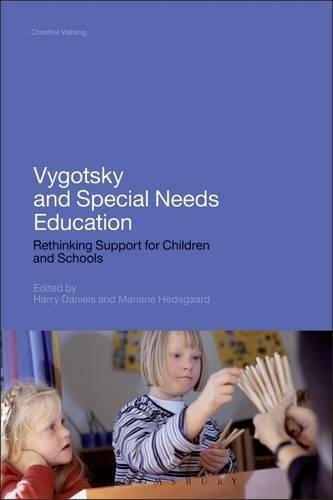
Vygotsky and Special Needs Education: Rethinking Support for Children and Schools
(Paperback)
Publishing Details
Vygotsky and Special Needs Education: Rethinking Support for Children and Schools
By (Author) Professor Harry Daniels
Edited by Professor Mariane Hedegaard
Continuum Publishing Corporation
Continuum Publishing Corporation
17th February 2011
United States
Classifications
Tertiary Education
Non Fiction
371.901
Physical Properties
Paperback
256
Width 156mm, Height 234mm
458g
Description
This is an international guide to using Vygotsky's theories to support children and schools in special needs education. After Piaget, Vygotsky is perhaps the most important educational theorist of the twentieth century. Support for schools and pupils with additional needs has been theorised in a number of ways over the last 100 years and much interest has been shown in the development and relevance of Vygotsky's ideas. It is ironic, therefore, that so little has been written about the practical application of such a perspective to the field. This book brings together researchers working in the UK and Denmark to reflect on the benefits to be had from taking such a stance on support for children and schools. All the contributors are connected with work that has been done at PPUK and CSAT research centres at the universities of Copenhagen and Bath. Both centres enjoy strong reputations for their contributions to cultural historical theory. The authors pursue issues raised by a post-Vygotskian approach and which make important contributions to the development of the fields of policy and practice.
Reviews
This is a book that people in educational politics, policy and provision need to read because it clarifies how we understand young people's educational needs and what we can do to make practical and institutional changes: it shines a light forward. The authors are all academic researchers who come from practitioner backgrounds and so they draw on and apply theoretical perspectives in the Vygotskian tradition that seek to guide intervention towards a person in a specific situation. You hear young people talking in this book and you know they are being listened to.' Malcolm Reed, Senior Lecturer in Education, University of Bristol, UK
Daniels and Hedegaard's edited collection is a significant contribution to an important field and will serve as a valuable resource for researchers and educational practitioners who aim to move beyond the limitations of simple biological and social dualism, take up the challenge of seeing cognition as always embedded in activity and trace the practical and theoretical implications of this for the area currently defined as special needs.' Jan Derry, Senior Lecturer in Philosophy of Education, Institute of Education, University of London, UK
Author Bio
Harry Daniels is Professor of Education: Culture and Pedagogy and Director of Centre for Sociocultural and Activity Research Theory at the University of Bath, UK. Mariane Hedegaard is Professor of Developmental Psychology and the Head of the Person, Practice, Development, and Culture Research Centre at the University of Copenhagen, Denmark. She is also Associate of the Department of Education, University of Oxford, UK.
